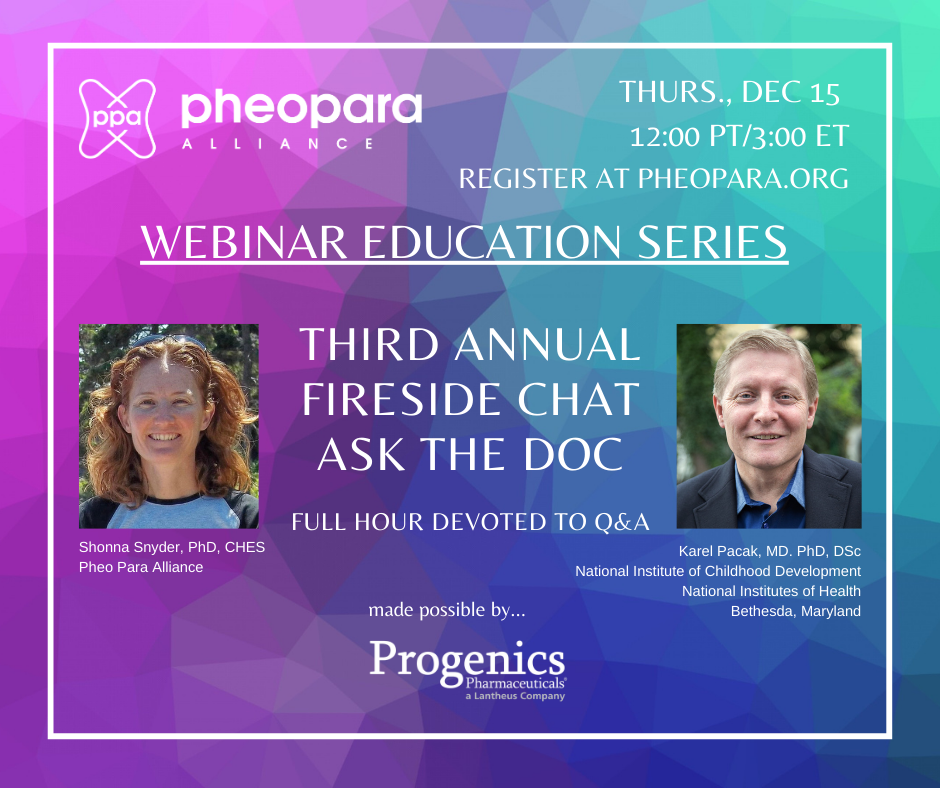Special thanks to Progenics for making this webinar series possible.
The information presented on this webinar is for educational purposes only and should not substitute the advice of your doctor(s) and medical team because they have in depth knowledge of your medical history and current situation.
Questions & timing are below:
Q 1 at 17:09 What recent developments in pheo/para are you most excited about?
Q 2 at 27:25 How close is Belzutifan to being FDA approved?
Q 3 at 31:27 You have done a study with vitamin C and subsequently with NRF2/antioxidant-pathway inhibitor (Brusatol). The results of this study in mice are promising. Especially with SDHx mutation. Will there be a human study? Follow-up?
Q 4 at 37:09 My 15 year old daughter has metastatic Paraganglioma and has been on Temozolomide for 14 months now – and will continue to take whilst we are seeing a partial response. Do you think combining Capecitabine with the Temozolomide should be discussed? My daughter is tolerating the Temo very well so would it be a good time to introduce the capecitabine?
Q 5 at 39:49 How often do you find that tumors grow back in same locations?
Q 6 at 42:10 No evidence of tumor but patient is symptomatic – what direction would you tell them to go with their doctor?
Q 7 at 45:25 Borderline labs – test later?
Q 8 at 47:43 Is metastatic pheochromocytoma curable?
Q 9 at 49:51 Have PPGL caused autonomic dysfunction?
Q 10 at 51:50 When would you advise AZEDRA after PRRT?
Q 11 at 58:53 Can my son (has had pheo in the past, confirmed mutation) go to the gym not knowing if he has a pheochromocytoma and exercise lightly with mild weight without overdoing it?
Q 12 at 01:00:54 I have 3 confirmed tumors. Part of the first one was left and has metastasized. I’m facing surgery but they are concerned about a NET in my pancreas and want to do a biopsy. All I’ve heard is to not biopsy.
Q 13 at 01:02:29 Does living in higher altitudes increase tumor growth? Does frequent flying precipitate hypoxia, and thus, promote the growth of paraganglioma?
Q 14 at 01:05:46 What type of ongoing screening do you recommend for someone who previously had a pheo removed?
Q 15 at 01:09:13 Any link between PPGL and other diseases – gallbladder disease, digestive problems, etc.?
Q 16 at 01:12:41 Can para be so small that it is undetectable by any currently known imaging, but cause severe symptoms and raise metanephrines significantly?
Q 17 at 01:16:22 What can a person do if that person has all of the symptoms, 4 time the amount of norepinephrine, SDHA mutation, a mother who had the same issue, but no tumor has been found?
Q 18 at 01:20:09 I had a CBT removed and have had a “cyst” on my kidney for years that no one is following. What labs should I ask my primary care physician to order?
Q 19 at 01:23:17 If a patient has an apparently non-secreting paraganglioma (e.g. they have no history of hypertension and metanephrine levels are normal) do they still need to be alpha-blocked before surgical removal?
Q 20 at 01:24:10 What causes polyuria in case of pheo/para?
